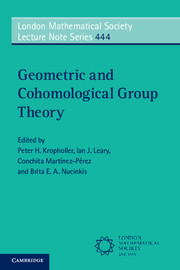Book contents
- Frontmatter
- Contents
- List of Participants
- Preface
- Obstructions for subgroups of Thompson's group V
- Groups of homological dimension one
- Braided diagram groups and local similarity groups
- On Thompson's group T and algebraic K-theory
- Special cube complexes (based on lectures of Piotr Przytycki)
- A hyperbolic group with a finitely presented subgroup that is not of type FP3
- The structure of Euclidean Artin groups
- Finitely presented groups associated with expanding maps
- On characteristic modules of groups
- Controlled algebra for simplicial rings and algebraic K-theory
Preface
Published online by Cambridge University Press: 11 October 2017
- Frontmatter
- Contents
- List of Participants
- Preface
- Obstructions for subgroups of Thompson's group V
- Groups of homological dimension one
- Braided diagram groups and local similarity groups
- On Thompson's group T and algebraic K-theory
- Special cube complexes (based on lectures of Piotr Przytycki)
- A hyperbolic group with a finitely presented subgroup that is not of type FP3
- The structure of Euclidean Artin groups
- Finitely presented groups associated with expanding maps
- On characteristic modules of groups
- Controlled algebra for simplicial rings and algebraic K-theory
Summary
This proceedings volume results from the fourth London Mathematical Society Durham Symposium of an influential series that belongs to the mathematical territory that we now see as part of Geometric Group Theory. Notably it was also the 100th in the entire series of LMS Durham Symposia. The first of these four meetings was held in 1976 organised by Scott and Wall, the second in 1994 organised by Kropholler and Stöhr (with Niblo as an additional editor for the proceedings volume), and the third in 2003 organised by Bridson, Kropholler and Leary. Proceedings volumes for these three meetings appeared in the London Mathematical Society Lecture Notes series as volumes 36, 252 and 358, and we are pleased to be able to continue this tradition.
This fourth meeting drew together some 80 mathematicians from around the world. It shared with the earlier meetings the high standards and significance of its main lecture series. These lecture series were delivered by Kai-Uwe Bux, Desi Kochloukova, Jon McCammond, Justin Moore, Piotr Przytycki, and Holger Reich. There was also room in the schedule for individual invited lectures from Azer Akhmedov, Collin Bleak, Brian Bowditch, Martin Bridson, Michael Davis, Ioannis Emmanouil, Dan Farley, Ross Geoghegan, Martin Kassabov, Conchita Martínez-Pérez, Volodymyr Nekrashevych, Nansen Petrosyan, Colva Roney-Dougal, Mark Sapir, Karen Vogtmann, Christian Wegner, John Wilson, Henry Wilton, and Stefan Witzel.
The titles of the four proceedings volumes that have flowed from these symposia have evolved in a way that mirrors the evolution of the subject: over a period of almost four decades, the role of geometry in group theory has grown hugely. This change was evident at the symposium and can also be seen in the present volume.
We thank all the authors who have contributed to this volume. We thank the London Mathematical Society and the Engineering and Physical Sciences Research Council for their support both in terms of advice and financially. The organisational burden that has in the past fallen on the scientific committee associated with an LMS Durham Symposium has now largely been replaced by the very supportive and tireless work of the administrative staff in the Mathematics Department of Durham University and we gratefully acknowledge this contribution, which has gone a long way to making these symposia run smoothly and ensuring that the focus is on the important science at the heart of our work.
- Type
- Chapter
- Information
- Geometric and Cohomological Group Theory , pp. ix - xPublisher: Cambridge University PressPrint publication year: 2017

